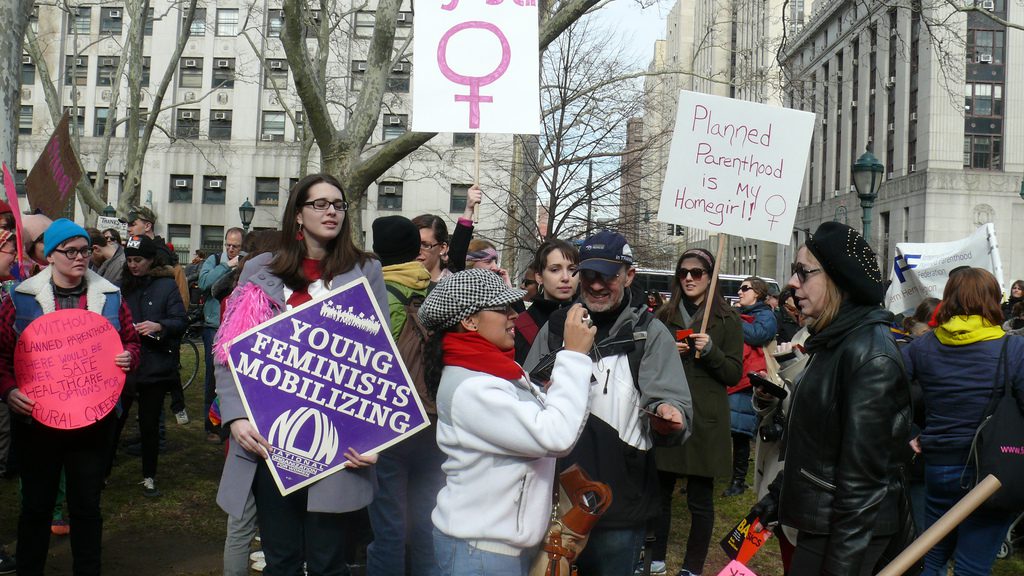Cliches of Progressivism: It is Essential to Embrace Intersectionality Gender scholar bell hooks* once
complained that audiences laugh when she describes the United States an “imperialist white-supremacist capitalist patriarchy.” That laughter, she said, was a “weapon of patriarchal terrorism.” But that was 14 years ago. Today, at least on the college campus, the terrorizing laughter has subsided. hooks is 23
rd on
TIME’s 2016 list of the “Hundred Most-Read Female Writers in College Classes.” And her assessment of the U.S. is foundational to “intersectional feminism.” This theory—now official doctrine in gender studies– portrays American society as a “matrix of domination and oppression.” And the list of oppressions keeps growing. Actress Laverne Cox, a frequent campus lecturer, expanded hooks’ formulation in a 2015
tweet: “Actually its cisnormative heteronormative imperialist white supremacist capitalist patriarchy.” Others have added ageist, able-ist, lookist, pro-natalist, and size-ist to the matrix. At the risk of sounding like a weapon of patriarchal terrorism, I don’t see progress here. I see a descent into madness. Proliferating “ists” and “isms” are turning many of our campuses into hostile environments for sanity. Students are organizing themselves into aggrieved little tribes that police and bully one another for imagined slights and micro-invalidations. On some campuses, intersectionality has tenure. Last year, 28 faculty members at Scripps College opposed former Secretary of State Madeline Albright as a speaker because her “category of ‘woman’ …evacuates feminism of its anti-racist, anti-imperialist potential.’ It’s hard to know how our institutions of higher learning will find their way back to truth, mutual understanding, and common humanity. But interrogating the founding principle of intersectionality––Professor hooks’ claim about the U.S. being an imperialist, white supremacist, capitalist patriarchy––is a good place to start. [tbc_video_embed url=”https://www.youtube.com/watch?v=cYpELqKZ02Q”] First, “imperialist.” America is certainly an economic, military, and cultural superpower. Yet it wields this power—in the
words of historian Niall Ferguson, “to spread free markets, to entrench the rule of law . . . and to pave the way for representative government.” This is in sharp contrast to empires from Persia to Rome to Napoleonic France, Imperial Japan, and the Soviet Union—who invaded, conquered, and plundered in order to enrich themselves. Even when the U.S. has invaded other countries, like Japan, Germany, Iraq, and Afghanistan, it has done so for a specific purpose, usually defensive—and it did not colonize them or plunder. When hostilities ceased, the U.S. always attempted, with varying levels of success, to create independent democracies, usually at great expense to the motherland. Our record is not spotless. But a menacing imperialist power, we are not. White-supremacist? The U.S. has a shameful history of racism. But we also have a long and honorable history of fighting it, from abolishing slavery to trying to overcome its legacy. A recent
study of racial tolerance by two Swedish economists found the U.S. to be among the world’s “most tolerant” societies. (India and Jordan were among the least tolerant.) Intersectional feminists claim that even if most Americans are tolerant, the white population still maintains supremacy through a rigid set of political, economic, and cultural structures. If so, it doesn’t seem to be succeeding.
Latino girls are now more likely to go to college than white boys. And the most successful demographic group in the US in terms of
income,
education, and
life-expectancy is not whites but Asians. Racism remains a problem, but anyone who calls the U.S. a white supremacist society is distorting reality. What about “Capitalist”? True as charged. The United States is a capitalist country—in other words, it is a country with economic liberty. And economic liberty is essential to human well-being. Without it, societies are miserable, poor, and oppressive. Look at Venezuela, Cuba, and North Korea. Compare life in Eastern Europe before and after free enterprise. Economic freedom, like all freedoms, can be abused. In the U.S., we are constantly looking for ways to prevent that. We don’t always succeed. But the free enterprise system has alleviated more human poverty and misery, and broken down more systems of oppression, than any other force in history. Finally, patriarchy. A patriarchy is a system in which men hold the power and women do not. Women do hold power in the United States—they lead major universities, giant corporations, and the nation’s powerful central bank. A woman almost won the presidency. (Of course, Slate intersectionalists quickly declared Electoral College to be an Instrument of “
White Supremacy and Sexism.” In fact, the Electoral College is an instrument of our federal, representative democracy.) American women, especially college women, are among the freest and most self-determining human beings in human history.Are things perfect for women? No. But they are not perfect for men, either. To refer to the U.S. as a patriarchy is absurd. It’s 2017, not 1950. With all due respect to Professor hooks, Ms. Cox, and intersectional feminists everywhere, the United States is not a matrix of oppression. It’s a matrix of freedom, opportunity, and happiness. The country has many flaws—few will dispute that. But it is also one of the most successful, diverse, tolerant, and open societies the world has ever seen. Why pretend otherwise? A word of unsolicited advice to campus intersectionalists from an age-enhanced, Jewish female with a cisgendered puppy named Izzy: Calm down. Come back to reality. Progress requires honest analysis and hard work, not antics and identity theatrics. *bell hooks spells her name without capital letters.
Christina Hoff Sommers is a resident scholar at the American Enterprise Institute. She is the author of several books including
Who Stole Feminism? and
The War Against Boys. She also hosts a video blog
The Factual Feminist Follow her @Chsommers




